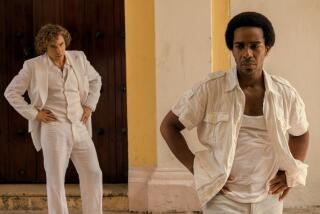The Long and Winding Tobacco Road
- Share via
When England found itself at war with Germany 60 years ago, the tight little island turned to America for weapons and ammunition. And British Prime Minster Winston Churchill asked the former colonies for a sought-after ration: cigarettes.
To keep up morale, each British soldier was given a supply of cigarettes during World War II. When the men returned home, 82% of the veterans were hooked.
Though the climate has changed drastically toward smoking since World War II, cigarettes are still one of the most successful products in the world. The new Learning Channel and BBC News documentary, “Tobacco Wars,” premiering Thursday and Friday on the cable network, offers an in-depth, historical and personal look at the tobacco industry.
Narrated by Walter Cronkite, the three-hour miniseries features archival footage; interviews with tobacco industry executives, marketing and advertising giants, research scientists, industry whistleblowers; and, of course, several representatives for campaigns against the industry.
The Learning Channel became partners in the production in March, when vice president of production Mary Ellen Iwata caught the trailer at a showcase for upcoming BBC shows.
Iwata was impressed that the BBC was able to get both sides of this controversial story. “We wouldn’t have done this if it weren’t a very balanced story about the tobacco industry and the tobacco wars, “ Iwata says.
Each hour of the documentary covers a different aspect of the tobacco equation. The series opens with “Lighting Up,” which chronicles the story of the modern cigarette and how American cigarette baron Buck Duke established the basis for today’s tobacco empires. In the 1950s and 60s, more and more information about the dangers of smoking began to surface and by 1964 the Surgeon General reported that there was a link between smoking and lung cancer.
“Smokescreen” examines how profits expanded during the
1960s and ‘70s and how the companies fought any type of opposition to smoking. The series concludes with “Smoked Out,” which focuses on the well-documented courtroom battles of the 1980s and ‘90s.
Among those interviewed for the documentary are Bennett LeBow, head of Ligget & Myers, who turned on his own industry when he admitted that cigarettes are addictive and cause lung cancer; Steve Goldstone, chairman of RJ Reynolds; Ernest Pepples, vice president of Brown & Williams; C. Everett Koop, former U.S. Surgeon General; Jeffrey Wigand, former vice president of research for Brown & Williamson who turned whistleblower; former Health, Welfare and Education Secretary Joseph Califano; former Lucky Strike and Chesterfield girl Janet Sackman who is suffering from throat and lung cancer; and Mike Moore, the attorney general of Mississippi, who sued tobacco companies and won.
BBC News producer Mark Hedgeco says it took nearly 18 months of wooing the tobacco industry to get them involved.
“We did a lot of interviews and a lot of long interviews to get what we wanted,” says Hedgeco, who adds they were looking for personal reflections--not the party line--from the tobacco honchos. “It was naive to think the industry would suddenly roll over and open its doors, but we got some pertinent reflection.”
A lot of research was done before the cameras rolled. “We went to everyone who appears in the program before we interviewed them on camera and talked to them on background to find out what they would say, what they felt strongly about.”
The tobacco industry, Hedgeco found, is unusually unified in its position. “It has been the last 50 years on the defensive, under attack. It has driven the industry together. By and large the industry’s position is that this is a legal product. It has been a legal product throughout the time they have been selling it, and if they stay within the regulations, it is their right to sell it.”
Ironically, several of the tobacco executives interviewed don’t smoke. “Even 20 years ago you were basically obligated to smoke [if you were an executive]. It was something odd if you didn’t,” says Hedgeco. “That’s changed.”
Despite all the health warnings, Hedgeco came out of the project believing that young people still take up smoking because they think they can live forever. “It won’t affect them,” says Hedgeco. “It has been proven statistically that people who carry on smoking for the rest of their lives are people who started very, very young.”
Hedgeco himself used to smoke, but gave it up. “On the series, we had two assistant producers who used to smoke at the beginning. One of them gave it up and one of them didn’t.”
“Tobacco Wars” airs Thursday and Friday at 9 p.m. on the Learning Channel.
More to Read
The complete guide to home viewing
Get Screen Gab for everything about the TV shows and streaming movies everyone’s talking about.
You may occasionally receive promotional content from the Los Angeles Times.







